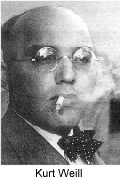|
|||||||||||||||||||
|
Home
| Kurt
Weill | Drew's books on Kurt Weill |
Drew's Weill
Editions: 1. Concert and Radio Works | |
|||||||||||||||||||
|
Performance materials: USA, UK 'etc': European American Music Corporation; All other territories Universal Edition Caution! There are performance materials still in circulation which contain the numerous copying errors and anomalies corrected during the sessions for the Ensemble Modern recording. Recording: LARGO CD 5114 (Ensemble Modern, c. HK Gruber) Night music - Work rhythms I - Worker's song I - Work rhythms II - Worker's song II - Finale: The Mussel from Margate Arranged (1975) from the incidental music for Konjunktur (1928) Instrumentation:
Duration: ca. 8 minutes Performance Materials: USA, UK 'etc': European American Music Corporation. All other territories: Universal Edition Recordings: LARGO CD 5114 (Ensemble Modern, c HK Gruber) Panamanian Suite (Suite panaméenne) Introduction and Tango - March of the Panamanian army - Youkali (tango-habanera) - Foxtrot This suite of four instrumental numbers from Marie Galante only became feasible after the discovery ca.1988 of the holograph score of the orchestral version of Youkali, and a defective set of band parts (including a holograph part) of another tango. At D's suggestion, a scrupulous reconstruction of the second tango was made by the composer and conductor HK Gruber for his Weill recording for Largo, 'Berlin im Licht' (it was surely this recording which prompted the Spanish film-maker Pedro Almodóvar to choose the instrumental Youkali in his 1993 hit-film Kika). Although live performances of the Panamanian Suite have invariably been received with rapturous applause, they are still few and far between, and have seldom been advertised except in the columns of the Kurt Weill Newsletter. Instrumentation: Duration: 11 minutes Performance materials: USA, UK 'etc': European American Music Corporation All other territories: Heugel Recording: Largo CD 5114 (Ensemble Modern, c HK Gruber) Pantomime I for vocal quartet and wind octet, excerpted from the opera Der Protagonist (1925). There is no language problem in Pantomime: the voice parts are purely phonetic. First identified as a concert piece in the context of the London Sinfonietta's 1975 Berlin Festival concerts and provided with a brief 'concert ending' that proved to be superfluous, Pantomime is a self-contained excerpt rather than an arrangement. It does, however, deserve mention in connection with other concert repertory involving similar forces. No staging of the pantomime-scenario is feasible in normal concert conditions. As the singing is wordless, musical scores are more easily dispensable, and some action will evolve almost of its own accord, even in a standard concert performance (with the scenario given in the programme book). Voices and
instrumentation: Duration: 10 minutes Performance Material: USA, UK 'etc': European American Music Corporation. All other territories: Universal Edition Recording: LARGO CD 5114 (Ensemble Modern, c. HK Gruber) Silbersee-Gesänge (Songs, Arias, and Duets
from The Silver Lake) A concert-ordering of most of the Silbersee music, without recourse to dialogue or narrations, was requested by the conductor Gary Bertini for his all-Weill programme at the 1975 Berlin Festival, and first performed on 10 September 1975 (by the Radio Symphony Orchestra, with Anja Silja and Günther Reich as soloists). It includes all the vocal numbers apart from the duet for Severin and Olim; the only other substantial omission is Olim's spoken soliloquy (with off-stage chorus) in the police station. Although exceptionally well received in 1975, and generally held to be a viable alternative to The Seven Deadly Sins as a concert piece, the sequence has not been performed again. Introduktion Intermezzo 1 (Foxtrott)
Intermezzo 2 (Das Schloß)
Intermezzo 3 (Andantino)
Instrumentation: Duration: 50 minutes Fantasy on Old American Themes, for tenor [baritone], SATB chorus and orchestra Trains Bound for Glory comprises the folksong arrangements Weill added for the 1940 revival of the original and immensely successful 1939 pageant Railroads on Parade. A popular success at The Barbican Centre in January 2000 (conductor, Stephen Jackson, soloist Thomas Randle), the Suite was commissioned by the American Symphony Orchestra for Leon Botstein's first concert as Music Director, and received its premiere, with William Brown as soloist, at Carnegie Hall on 20th September 1992. Voices and instrumentation:
Prelude: Sacramento (orchestra)
Duration: 20 minutes Publisher: European American Music Corporation |
|||||||||||||||||||
|
|||||||||||||||||||
|
Material Copyright © 2002 David Drew. |
|||||||||||||||||||
